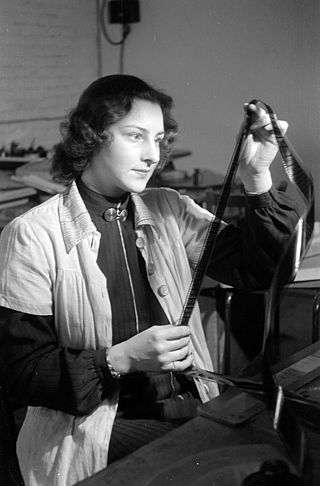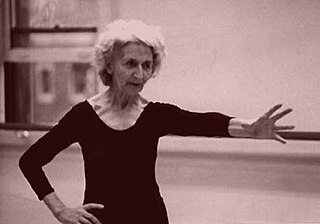Related Research Articles

Film editing is both a creative and a technical part of the post-production process of filmmaking. The term is derived from the traditional process of working with film which increasingly involves the use of digital technology. When putting together some sort of video composition, typically, you would need a collection of shots and footages that vary from one another. The act of adjusting the shots you have already taken, and turning them into something new is known as film editing.
HJ International Graduate School for Peace and Public Leadership formerly known as Unification Theological Seminary (UTS) from its founding in 1975 until July 2023 is a private Unification Church-affiliated graduate seminary headquartered in Midtown Manhattan, New York City, New York. The seminary was granted an absolute charter from the State of New York in January 1984 and received accreditation from the Middle States Commission on Higher Education in November 1996.

The University of Technology Sydney (UTS) is a public research university located in Sydney, New South Wales, Australia. The university was founded in its current form in 1988, though its origins as a technical institution can be traced back to the 1870s. UTS is a founding member of the Australian Technology Network (ATN), and is a member of Universities Australia (UA) and the Worldwide Universities Network (WUN).
A dance film is a movie in which dance/ballet is used to reveal inspirational challenges and the central themes of the film, whether these themes be connected to narrative or story, states of being, or more experimental and formal concerns. In such films, the creation of choreography typically exists only in film or video. At its best, dance films use filming and editing techniques to create twists in the plotline, multiple layers of reality, and emotional or psychological depth.

Wozzeck is the first opera by the Austrian composer Alban Berg. Composed between 1914 and 1922, it premiered in 1925. It is based on the drama Woyzeck, which German playwright Georg Büchner left incomplete at his death. Berg attended the first production in Vienna of Büchner's play on 5 May 1914, and knew at once that he wanted to base an opera on it. From the fragments of unordered scenes left by Büchner, Berg selected 15 to form a compact structure of three acts with five scenes each. He adapted the libretto himself, retaining "the essential character of the play, with its many short scenes, its abrupt and sometimes brutal language, and its stark, if haunted, realism..."

Broadway is a 700-metre (2,300 ft) road in inner city Sydney, New South Wales, Australia. The road constitutes the border between the suburbs of Ultimo and Chippendale. Broadway is also an urban locality.

David Tacey is an Australian public intellectual, writer and interdisciplinary scholar. He is Emeritus Professor of Literature at La Trobe University in Melbourne and Research Professor at the Australian Centre for Christianity and Culture in Canberra.
Gavan McCormack is a researcher specializing in East Asia who is Emeritus Professor and Visiting Fellow, Division of Pacific and Asian History of the Australian National University. He is also a coordinator of an award-winning open access journal The Asia-Pacific Journal: Japan Focus.

Lisa Harrow is a New Zealand RADA-trained actress, noted for her roles in British theatre, films and television. She is perhaps best known for her portrayal of Nancy Astor in the British BBC television drama Nancy Astor.

Karen Sosnoski is an American author, radio contributor, and documentary filmmaker.
Betsy Morrell Bryan is an American Egyptologist who is leading a team that is excavating the Precinct of Mut complex in Karnak, at Luxor in Upper Egypt.
Kenneth M. Zeichner is Boeing Professor of Teacher Education and was the Director of Teacher Education from 2009 to 2013 at the University of Washington. He was the Hoefs-Bascom Professor of Teacher Education and Associate Dean for Teacher Education, University of Wisconsin–Madison. He received his Ph.D. in 1976 from Syracuse University in educational psychology and has been on the faculty at Madison since that time. He has had visiting appointments at Umeå University (Sweden), Simon Fraser University (Canada), and the University of Southern California.
Richard James Allen is a contemporary Australian poet, dancer, actor and filmmaker. The former artistic director of the Poets Union Inc, and founding director of the Australian Poetry Festival, Allen was co-artistic director with Karen Pearlman of That Was Fast and Tasdance (Launceston), and now at The Physical TV Company (Sydney).
Some claim that the history of anorexia nervosa begins with descriptions of religious fasting dating from the Hellenistic era and continuing into the medieval period. A number of well known historical figures, including Catherine of Siena and Mary, Queen of Scots are believed to have suffered from the condition. Others link the emergence of anorexia to the distinctive presence of an extreme fear of being overweight despite being underweight which emerged in the second half of the 19th century and was first observed by Jean Martin Charcot and other French psychiatrists at the Salpetrière
Leonie Sandercock is an urban planner and academic focusing on community planning and multiculturalism. Her work spans the interdisciplinary fields of urban studies, urban policy and planning and elucidates issues of difference, social justice and possibility. She has been teaching at the School of Community & Regional Planning at University of British Columbia, Vancouver, Canada, since 2001.

Ecstatic dance is a form of dance in which the dancers, sometimes without the need to follow specific steps, release themselves to the rhythm and move freely as the music takes them, leading to trance and a feeling of ecstasy. The effects of ecstatic dance begin with ecstasy itself, which may be experienced in differing degrees. Dancers are described as feeling connected to others, and to their own emotions. The dance serves as a form of meditation, helping people to cope with stress and to attain serenity.
William Walker Tait (1929–2024) was an emeritus professor of philosophy at the University of Chicago, where he served as a faculty member from 1972 to 1996, and as department chair from 1981 to 1987.
Peter Boyle is an English film editor with more than 30 feature film credits. His work on the film The Hours (2002) was nominated for the Academy Award, the BAFTA Award, and the ACE Eddie, and other honors.

Irmgard Bartenieff was a dance theorist, dancer, choreographer, physical therapist, and a leading pioneer of dance therapy. A student of Rudolf Laban, she pursued cross-cultural dance analysis, and generated a new vision of possibilities for human movement and movement training. From her experiences applying Laban’s concepts of dynamism, three-dimensional movement and mobilization to the rehabilitation of people affected by polio in the 1940s, she went on to develop her own set of movement methods and exercises, known as Bartenieff Fundamentals.
Gisela Kaplan is an Australian ethologist who primarily specialises in ornithology and primatology. She is a professor emeritus in animal behaviour at the University of New England, Australia, and also honorary professor of the Queensland Brain Institute.
References
- ↑ "Cutting Shapes". filmink.com.au. Retrieved 19 October 2009. Film Ink, "Cutting Shapes"
- ↑ "Cutting Rhythms By: Karen Pearlman, Publisher: Focal Press". UTS:Postgraduate. Retrieved 19 October 2009. UTS: Postgraduate, "Cutting Rhythms"
- ↑ "Cutting Rhythms - Shaping The Film Edit By Dr Karen Pearlman". memorabletv.com. Retrieved 19 October 2009.Memorabletv.com, "Cutting Rhythms"